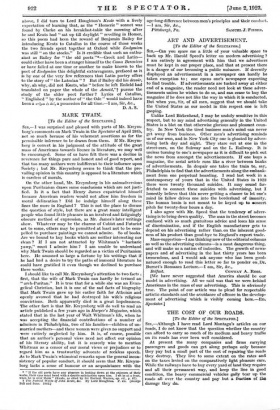MARK TWAIN.
[To the Editor of the SPECTATOR.] Sin,—I was surprised and pleased with parts of Mr. Kreym- borg's comments on Mark Twain in the Spectator of April 28th, not so much because of his vehement assertions as for the permissible inference to be drawn from them. If Mr. Kreym- borg is correct in his judgment of the attitude of the great mass of Americans towards licence in literature, we may well be encouraged. Some of us have felt there was a decline in reverence for things pure and honest and of good report, and that too many authors were indifferent to their influence upon Society ; but Mr. Kreymborg seems to think that the pre- vailing opinion in this country is opposed to a literature which is careless of morals.
On the other hand, Mr. Kreymborg in his animadversions upon Puritanism draws some conclusions which are not justi- fied. Is it a fact that Henry James expatriated himself because American readers would not allow him freedom in moral delineation ? Did he indulge himself along these lines the more in England ? This is not the place to discuss the question of style, but there are a great many intelligent people who found little pleasure in an involved and fatiguingly obscure method of expression, as Mr. James's later writings show. Whatever may be the charms of Cubist and Futurist art to some, others may be permitted at least not to be com- pelled to purchase paintings we cannot admire. So of books. Are we bound to buy books which are neither interesting nor clean ? If I am not attracted by Whitman's " barbaric yawp," must I admire him ? I am unable to understand why Mark Twain should be regarded as a victim of Puritanism here. He amassed so large a fortune by his writings that if he had had a desire to try the paths of immoral literature he could have gratified it even though we declined to purchase these works.
I should like to call Mr. Kreymborg's attention to two facts first, that the wife of Mark Twain can hardly be termed an " arch-Puritan." It is true that for a while she was an Evan- gelical Christian, but it is one of the sad facts of biography that Mark Twain gave up his earlier faith for Atheism and openly avowed that he had destroyed his wife's religious convictions. Both apparently died in a great hopelessness. The other fact is that Mr. Kreymborg will do well to read an article published a few years ago in Harper's Magazine, which stated that in the last year of Walt Whitman's life, when he was accepting the financial contributions of a number of admirers in Philadelphia, two of his families—children of un- married mothers—and these women were given no support and were entirely neglected by him. It is, of course, possible that an author's personal vices need not affect our opinion of his literary ability, but it is scarcely wise to mention Whitman as a censor of our moral views or prejudiees or to regard him as a trustworthy advocate of reckless speech.
As to Mark Twain's whimsical remarks upon the general incon- sistency of popular conduct, it should seem that Mr. Kreym- borg lacks a. sense of humour or an acquaintance with the
• " If the old poets have any pleasure in looking down at the enjoyers of their works, their eyes must bend with a double satisfaction upon him. I It as at a feast, when he is over them " (Keats, as cited by Sir Herbert Warren, op. cit., p. 67). t The Poetical Work* of John Heals, (to. By Lord Houghton. P. ill. (George Bell amid Sons. 1883.)
age-long difference between men's principles and their conduct. —I am, Sir, &c.,










































 Previous page
Previous page